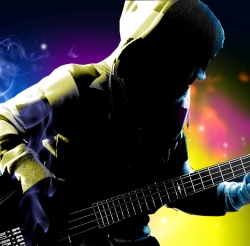
Reply by Craig
I’ve had situations on large stage “throw-and-go” festivals where the bass mic has saved the set. Clicky, poorly executed slap-bass and sudden buzzes in the DI line or the trend in some harder rock acts to run a distortion pedal of some kind… All sounded nasty on the direct feed but were evened-out and “smoothed” a bit by the amp cones. The mic allows me to get a mix up and running quickly while the stage crew deals with other issues.
I usually mic the side of the cone and avoid the tweeter (if any) traditionally using a 421, but have used a larger-diaphragm member from the current crop of bass-drum mics as well. Usually always a dynamic, but little goosneck clip-on drum mics have worked for me occasionally.
Bass amp quality matters, as well as distance from other stage sounds. Large outdoor stages work the best, for small club I wouldn’t even bother with a mic.
Reply by Ivan
As usual-it depends.
A DI will give the cleanest sound. But in some cases, the sound of the bass is SUPPOSED to be dirty. That is what they are looking for. So a mic is the best way to deal with that.
HOWEVER-if you use both a mic and a DI, when both are used at the same time, you can have some serious issues. The main thing being the latency between the mic and the DI. That is called “comb-filtering.” (Maybe you have heard me mention it before)
Let’s assume a analog bass path. Digital anywhere after the DI point will add latency. But since the mic cannot be directly on the speaker cone, it sits some distance away. This distance (between when the signal comes out of the amp) and before it gets to time mic take time. And that time is latency.
So the signal coming from the DI and the speaker arrive at the console inputs at different times. (Comb-filtering.) If you have a digital console you can delay the DI input.
The problem is “how much?” The “proper way” would be to take an impulse response measurement of the signal going into the DI and the mic-figure out the time difference and add it to the mic. But most people will not take the time to do that, or don’t have the tools/knowledge to do so. So we are either left to guess at what time “sounds best” or do nothing.
In the old analog days, the only tool we had was polarity. That would sometimes help or hurt. We just played with it until it sounded “better.”
But unless the time is exactly correct, there WILL be cancellation and peaks at various frequencies. So be careful in what you do, why you do it, and HOW you do it.
All this only matters if you care about getting the best sound. But sadly these days, sound quality is not up on the top of most people’s list.
Reply by John
Comb-filtering and stage bleed are my main concerns. Mark brought up an excellent point about making the bass player feel better. Seems like very little effort to get a better relationship with a musician. Especially one that has spent a lot of time and money on his sound.
I’m going to mic the bass, for the bass players peace of mind, and it will make a usable backup for the DI. We’ve all had a few of them fail.
Whether or not I actually use it… mums the word.
Do you have any suggestions or ideas about this one? Click here to go straight to this forum thread to ask questions or add comments. Click here to access any of the forum categories.
